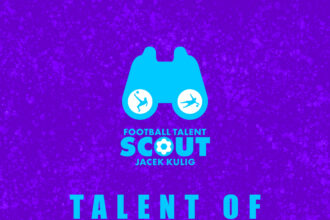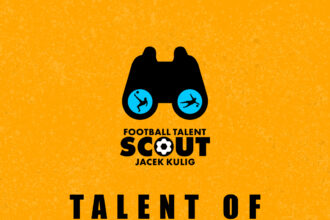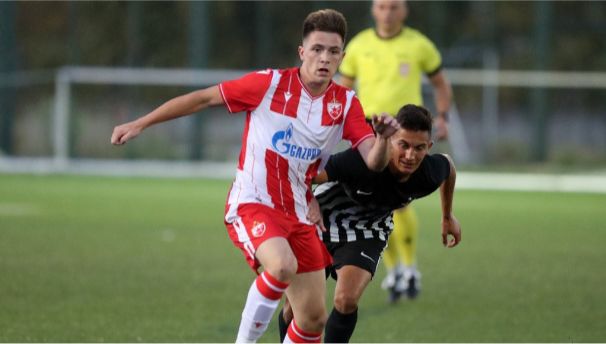The rise of the universal midfielder by The Balkan Football Scout
Football has changed drastically over the last decades. Conditioning, collective defensive responsibility and transitions – among other aspects – are more important than ever, but one constant remains: the importance of midfield. The pure destroyers of the past however are slowly but surely going extinct at the highest levels. Modern football instead requires universal midfielders. Today I present you such a midfielder, his name: Nikola Stanković and he plays for Red Star’s satellite club, FK Grafičar.
The hope of a small town
Nikola (18) hails from a small town in the heart of Serbia named Vrnjačka Banja. A quiet place with just over 10,000 inhabitants that has produced only one Yugoslav international, Vladislav Djukić. A tall left-winger who featured twice in friendlies in 1988 and ended up playing one season in Serie A after that. I’m hopeful however that Stanković will be the next one and will gather many more caps for the national team, and I’ll tell you why.
An intelligent pitbull
Although he shares the same last name as Red Star’s current manager, the legendary Deki Stanković, they are not related. Nikola does however share some characteristics with Dejan. Like him, he is a hard-working central midfielder, who hopes to break through at Red Star. What sets Nikola apart from a lot of players is his outstanding mentality. He may not be the most refined player, but his intelligence, determination and work rate more than compensate for it. He is a true team player and one who always leaves it all out on the pitch. The type of player you root for and hope he makes it.
Universal midfielder
One of his main qualities is his anticipation. When you watch him play, you are reminded of good chess players, who always think at least a couple of moves ahead. He is, like I mentioned, a modern midfielder in every sense of the word. One who can run for 120 minutes if necessary and who always tries to play progressive football, whether by driving the ball forward, or quick forward passing. Once he plays the ball, he starts running into space. You’ll never catch him ball watching. The weight he puts on his passes is usually a thing of beauty. And finally, it won’t surprise you that he is not a player to shy away from duels, the impressive part is that he wins nearly 80% of them.
The devil is in the details
There are many aspects of his game that Stanković can improve, whether technical, tactical or physical. When you look at the statistics, the goal and assist columns are still fairly empty. Some of it is due to lack of quality in finishing of his teammates, however Nikola’s shooting also needs to improve. He is a decent header of the ball, but only wins one of out of every three aerial duels. His composure is alright for now, but there is progress to be made in that department. His weaker left foot could also use some work. Luckily, time is on his side.
Versatility is king these days
With the lack of quality right backs in Serbian football at the moment and at Red Star in particular, Nikola has been tried out in that position in a couple of league games at Grafičar. He has a lot of characteristics that modern fullbacks posses: work rate, defensive capabilities, off the ball movement, playmaking and more. Added to that, he has the acceleration and pace that are needed for the role. But with the arrival of former Italian international Cristiano Piccini, this idea seems to have been put on hold. Still, being able to play in different positions is considered a major asset in today’s game, and who knows what the future holds.
Being groomed
Red Star as a club have taken serious steps over the last five years. From being 209th in the UEFA rankings in 2015 to an impressive 35th spot in the latest version. Last year, they were knocked out of the Europa League by AC Milan on away goals. Something you couldn’t have imagined just five years ago. This newfound sense of glory has helped lift the standards within the club, and that made it more difficult for youngsters to break through. Some have succeeded, think of Marko Grujić (Porto) or speedster Nemanja Radonjić (Benfica), but it is a steep climb for most of them. This is why Red Star got themselves a satellite club, FK Grafičar. A small team in the Serbian first division – one below Red Star – where Nikola gets his 90 minutes every week.
Harsh reality
The darker side of Red Star’s success is its fragility. One year without European group stage football could cause a lot of financial damage. The quality of players has improved, but so have the salary demands. This leaves very little margin for error. Results are everything and with the team trailing five points behind arch rivals Partizan right now, there is no room for experimenting. Another important thing to note is that Red Star have a very experienced senior squad, with a lot of players who hold little to no resell value. This means that the much-needed transfer money has to come from youngsters. Kids like Luka Jović (Benfica), Ivan Ilić (Manchester City) and the other day, Marko Lazetić (AC Milan). Instead of making a name for themselves at the club they support, they get limited minutes just to get sold on. Local rivals, Dinamo Zagreb, do a much better job of integrating their youth, but that’s another story altogether.
Close to the first team
Nikola is actually with Red Star’s first team now, going through their preparations for the second half of the season. He’s made a fine impression so far, and seems to be one of the serious candidates for a spot on the Serbian champion’s roster. The question however is if this would be beneficial to his development? Sure, he’ll train with much better players, but his playing time will be limited. The better choice in my opinion is to finish the season at Grafičar and become a rotational first team member next season.
What the future holds
The Serbian league is going through a renaissance of sorts. They are closing in on that famous 12th spot, which guarantees 2 qualification places for the Champions League. Don’t let this ‘glorious’ achievement fool you, though. Serbian football is plagued by inadequate pitches, poor infrastructure, lousy attendances and at times, outdated coaching methods. Despite all of that, the country still produces quality players. Players like the ones who won the U20 World Cup in 2015, many of whom helped knock out mighty Portugal to qualify for next year’s World Cup. This World Cup will come too soon for Nikola Stanković, but I’m sure his time will come. Ideally, he’d play for Red Star for at least two seasons, move to a team like AZ or Feyenoord and end up in the Bundesliga about four years after that. Note that he’ll never be a world-class player, but every good team needs at least a couple of players like Nikola.
● Nikola Stanković
● Central midfielder
● 18 years old | 1.81 cm | Right footed
● On loan at FK Grafičar (owned by Red Star Belgrade)
● Potential rating: 7,5/10








Hi,Dear nice to meet you i am Harold martha pleaseI know that it looks strange to contact whom you dont know, but i plead for your respond to my privet Email, (Haroldmartha35@gmail.com)so that we can exchange ideas for reasons